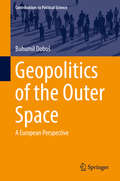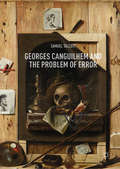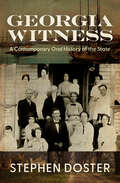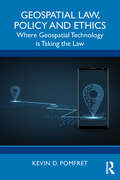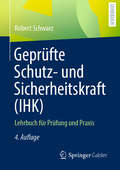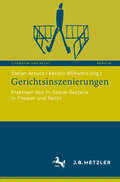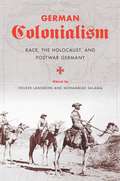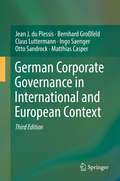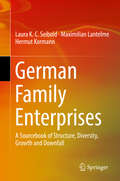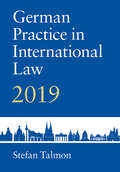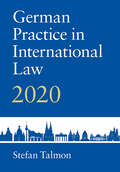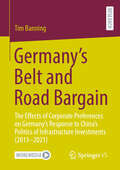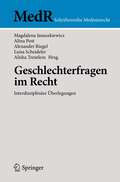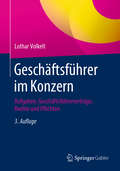- Table View
- List View
Geopolitics of the Outer Space: A European Perspective (Contributions to Political Science)
by Bohumil DobošThis book presents a comprehensive geopolitical analysis of European space activities. By studying outer space as a physical and socio-economic space as well as a military-diplomatic area, the author helps readers understand outer space as a geopolitical environment. The book also offers insights into the behavior and strategies of different actors, with a special focus on the European space strategy and the nature of the European space program and diplomacy.
Georges Canguilhem and the Problem of Error
by Samuel TalcottExamining Georges Canguilhem’s enduring attention to the problem of error, from his early writings to Michel Foucault’s first major responses to his work, this pathbreaking book shows that the historian of science was also a centrally important philosopher in postwar France. Samuel Talcott elucidates Canguilhem’s contributions by drawing on previously neglected publications and archival sources to trace the continuity of commitment that led him to alter his early anti-vitalist, pacifist positions in the face of political catastrophe and concrete human problems. Talcott shows how Canguilhem critically appropriated the philosophical work of Alain, Bergson, Bachelard, and many others while developing his own distinct writings on medicine, experimentation, and scientific concepts in an ethical and political endeavor to resist alienation and injustice. And, while suggesting Canguilhem’s sometimes surprising philosophical importance for a range of younger thinkers, the book demonstrates Foucault’s own critical allegiance to Canguilhem’s spirit, techniques, and investigations.
Georgia 2017 Driver's Manual
by Georgia Department of Driver ServicesThis manual is produced by the Regulatory Compliance Division of Georgia Department of Driver Services. The information contained in this manual is not intended to be an official legal reference to the Georgia traffic laws. It is intended only to explain, in everyday language, those laws, driving practices, and procedures that you will use most often. It should be noted that the material in this manual is subject to change to comply with amended State and Federal legislation. The department’s primary statutory responsibilities are set forth in Title 40 of the Official Code of Georgia Annotated (O.C.G.A.)
Georgia Witness: A Contemporary Oral History of the State
by Stephen DosterDrawing on the voices of residents from across the state, this oral history reflects on life in Georgia as it evolved throughout the twentieth century. Author Stephen Doster grew up on St. Simons Island, one of Georgia&’s Golden Isles. He began interviewing fellow island residents and captured their personal histories in the book Voices from St. Simons. Now, Doster has expanded the scope of his work to encompass the entire state of Georgia. In Georgia Witness, Doster records the stories of residents from all across the state, capturing the unique life and history of its many communities. Here are the voices of influential figures and ordinary residents, individuals of varying backgrounds and ethnicities, all of whom remember and contribute to the legacy and lifeblood of the peach state.
Geospatial Law, Policy and Ethics: Where Geospatial Technology is Taking the Law
by Kevin D. PomfretThis comprehensive textbook identifies the emerging legal, policy, and ethical considerations associated with the collection, analysis, storage, and distribution of data that can be tied to location on Earth – otherwise known as “geospatial information.”Drawing on the author’s extensive professional, legal, and scholarly experience in the geospatial community, the book explains how these issues cut across both legal and technology domains and how they impact geospatial information management across the globe. While focused on the USA, the framework and analysis can be applied to other nations and legal systems. Key topics covered include intellectual property, privacy, data protection, data quality and liability, security, ethical issues, licensing, and the impact of existing and emerging technologies, such as artificial intelligence, satellites, drones, software, machine learning, small satellites, and 5G. The book includes helpful features, such as a glossary of key legal terms and further reading, and is accompanied by digital supplements in the form of PowerPoint slides for each chapter.Geospatial Law, Policy and Ethics is the ideal companion for advanced undergraduate and graduate-level students of Geographic Information System (GIS), remote sensing geospatial intelligence, geospatial studies, and spatial data science courses. It will also be of interest to geospatial professionals employed in industry, government, or research.
Geprüfte Schutz- und Sicherheitskraft (IHK)
by Robert SchwarzDas vorliegende Lehrbuch richtet sich an alle, die die Prüfung zur Schutz- und Sicherheitskraft vor einer Industrie- und Handelskammer ablegen wollen, und eignet sich zugleich als Nachschlagewerk für die Praxis sowie zur regelmäßigen Weiterbildung. Die überarbeitete und aktualisierte 2. Auflage wurde dem aktuellen Rechtsstand 2018 angepasst und behandelt systematisch alle prüfungsrelevanten Fachgebiete. Besonderen Wert hat der Autor auf den oft als schwierig empfundenen Rechtsteil gelegt: Zahlreiche Abbildungen und Beispiele veranschaulichen die Inhalte und ihre Bedeutung für die Praxis, erleichtern das Stoffverständnis und das Lernen: Die ideale Prüfungsvorbereitung - Schritt für Schritt.
Geprüfte Schutz- und Sicherheitskraft (IHK): Lehrbuch für Prüfung und Praxis
by Robert SchwarzDas vorliegende Lehrbuch richtet sich an alle, die die Prüfung zur Schutz- und Sicherheitskraft vor einer Industrie- und Handelskammer ablegen wollen, und eignet sich zugleich als Nachschlagewerk für die Praxis sowie zur regelmäßigen Weiterbildung. Die aktualisierte 4. Auflage wurde dem aktuellen Rechtsstand im Frühjahr 2020 angepasst, insbesondere wurden die aktuellen Bestimmungen im Gewerberecht - GewO und BewachV - eingearbeitet. Das Werk behandelt systematisch alle prüfungsrelevanten Fachgebiete. Besonderen Wert hat der Autor auf den oft als schwierig empfundenen Rechtsteil gelegt: Zahlreiche Abbildungen und Beispiele veranschaulichen die Inhalte und ihre Bedeutung für die Praxis, erleichtern das Stoffverständnis und das Lernen: Die ideale Prüfungsvorbereitung - Schritt für Schritt.
Geprüfte Schutz- und Sicherheitskraft (IHK): Lehrbuch für Prüfung und Praxis
by Robert SchwarzDas vorliegende Lehrbuch richtet sich an alle, die die Prüfung zur Schutz- und Sicherheitskraft vor einer Industrie- und Handelskammer ablegen wollen, und eignet sich zugleich als Nachschlagewerk für die Praxis sowie zur regelmäßigen Weiterbildung. Die gründlich durchgesehene und verbesserte 5. Auflage entspricht dem aktuellen Rechtsstand 2020/2021 und berücksichtigt auch die Bestimmungen im Gewerberecht – GewO und BewachV. Das Werk behandelt systematisch alle prüfungsrelevanten Fachgebiete. Besonderen Wert hat der Autor auf den oft als schwierig empfundenen Rechtsteil gelegt: Zahlreiche Abbildungen und Beispiele veranschaulichen die Inhalte und ihre Bedeutung für die Praxis, erleichtern das Stoffverständnis und das Lernen: Die ideale Prüfungsvorbereitung – Schritt für Schritt.
Geprüfte Schutz- und Sicherheitskraft (IHK): Lehrbuch für Prüfung und Praxis
by Robert SchwarzDas vorliegende Lehrbuch richtet sich an alle, die die Prüfung zur Schutz- und Sicherheitskraft vor einer Industrie- und Handelskammer ablegen wollen, und eignet sich zugleich als Nachschlagewerk für die Praxis sowie zur regelmäßigen Weiterbildung. Die überarbeitete 6. Auflage entspricht dem aktuellen Rahmenstoffplan vom Mai 2021 und behandelt systematisch alle prüfungsrelevanten Fachgebiete. Besonderen Wert hat der Autor auf den oft als schwierig empfundenen Rechtsteil gelegt: Zahlreiche Abbildungen und Beispiele veranschaulichen die Inhalte und ihre Bedeutung für die Praxis, erleichtern das Stoffverständnis und das Lernen: Die ideale Prüfungsvorbereitung – Schritt für Schritt.
Gerichtsinszenierungen: Praktiken des In-Szene-Setzens in Theater und Recht (Literatur und Recht #18)
by Stefan Arnold Kerstin WilhelmsDie Beiträge des Bandes gehen der These nach, dass in Gerichtsprozessen sowie in theatralen Gerichtsperformances Inszenierungspraktiken am Werk sind, deren Untersuchung zeigt, wie sich die sozialen Felder Recht und Theater gegenseitig konstituieren. Die rechtswissenschaftlichen Beiträge untersuchen, wie theatrale Praktiken des Inszenierens Gerichtsprozesse strukturieren und bedeutsam machen. Die literaturwissenschaftlichen Beiträge untersuchen theatrale Inszenierungen von Gerichtsprozessen als (politische) Kommentierung realer Verfahren bzw. als metareflexive Verhandlung sozialer Praktiken im Gerichtsverfahren.
German Colonialism: Race, the Holocaust, and Postwar Germany (Routledge Studies In Modern European History Ser.)
by Mohammad Salama Eds. Langbehn VolkerMore than half a century before the mass executions of the Holocaust, Germany devastated the peoples of southwestern Africa. While colonialism might seem marginal to German history, new scholarship compares these acts to Nazi practices on the Eastern and Western fronts. With some of the most important essays from the past five years exploring the "continuity thesis," this anthology debates the links between German colonialist activities and the behavior of Germany during World War II. Some contributors argue the country's domination of southwestern Africa gave rise to perceptions of racial difference and superiority at home, building upon a nascent nationalism that blossomed into National Socialism and the Holocaust. Others remain skeptical and challenge the continuity thesis. The contributors also examine Germany's colonial past with debates over the country's identity and history and compare its colonial crimes with other European ventures. Other issues explored include the denial or marginalization of German genocide and the place of colonialism and the Holocaust within German and Israeli postwar relations.
German Corporate Governance in International and European Context
by Ingo Saenger Otto Sandrock Bernhard Großfeld Claus Luttermann Matthias Casper Jean J. du PlessisCorporate governance encompasses the free enterprise system, which is treated comprehensively in this book from a German perspective. This distinguishes the book from other books written in English in this subject area, not only because of the comprehensive way it covers German corporate law and corporate governance, but also because of the fact that it provides international and European perspectives on these important topics. This second edition is an extensively revised and updated version of the first edition, in particular with a view to the worldwide debt crisis. The authors provide readers with an overview of the unique features of German business and enterprise law and an in-depth analysis of the organs of governance of German public limited companies (general meeting, management board, supervisory board). In addition, approaches for reforms required at the international level are also suggested and discussed, including, among others, the unique interplay and dynamics of the German two-tier board model with the system of codetermination, referring to the arrangement of employees sitting on the supervisory boards of German public limited companies and private companies employing more than 500 employees; also covered are significant recent legal developments in Europe. The book highlights the core function of valuation and financial reporting at the international, European and German levels, with accounting as the documentary proof of good corporate governance. It also expands the scope of the first edition by a treatment of the German financial sector, global corporate finance and governance, and by including a new chapter on compliance of corporate governance laws, rules and standards in Germany. As far as comparative law is concerned, new developments in the area of corporate governance in the EU, the OECD Principles of Corporate Governance and corporate governance in the US, the UK and Australia are covered. The book is addressed to researchers, practitioners and basically anyone with an interest in the complex, but intriguing areas of corporate law and corporate governance.
German Corporate Governance in International and European Context
by Ingo Saenger Otto Sandrock Bernhard Großfeld Claus Luttermann Matthias Casper Jean J. du PlessisCorporate governance encompasses the free enterprise system, which is treated comprehensively in this book from a German perspective. This distinguishes the book from other books written in English in this subject area, not only because of the comprehensive way it covers German corporate law and corporate governance, but also because of the fact that it provides international and European perspectives on these important topics. This second edition is an extensively revised and updated version of the first edition, in particular with a view to the worldwide debt crisis. The authors provide readers with an overview of the unique features of German business and enterprise law and an in-depth analysis of the organs of governance of German public limited companies (general meeting, management board, supervisory board). In addition, approaches for reforms required at the international level are also suggested and discussed, including, among others, the unique interplay and dynamics of the German two-tier board model with the system of codetermination, referring to the arrangement of employees sitting on the supervisory boards of German public limited companies and private companies employing more than 500 employees; also covered are significant recent legal developments in Europe. The book highlights the core function of valuation and financial reporting at the international, European and German levels, with accounting as the documentary proof of good corporate governance. It also expands the scope of the first edition by a treatment of the German financial sector, global corporate finance and governance, and by including a new chapter on compliance of corporate governance laws, rules and standards in Germany. As far as comparative law is concerned, new developments in the area of corporate governance in the EU, the OECD Principles of Corporate Governance and corporate governance in the US, the UK and Australia are covered. The book is addressed to researchers, practitioners and basically anyone with an interest in the complex, but intriguing areas of corporate law and corporate governance.
German Family Enterprises: A Sourcebook of Structure, Diversity, Growth and Downfall
by Hermut Kormann Maximilian Lantelme Laura K.C. SeiboldThis professional guide presents an extensive overview of the German family enterprise landscape, with a special focus on its structure and diversity. Drawing on several scientific studies conducted by the authors, its goal is to provide a detailed assessment of the development of German family enterprises. Analyzing data from over 500 family firms, it offers a valuable reference guide for market research and academic research on family-owned enterprises. A unique factor: the authors’ revealing insights into the decline of family firms.
German Idealism
by Frederick C. BeiserOne of the very few accounts in English of German idealism, this ambitious work advances and revises our understanding of both the history and the thought of the classical period of German philosophy. As he traces the structure and evolution of idealism as a doctrine, Frederick Beiser exposes a strong objective, or realist, strain running from Kant to Hegel and identifies the crucial role of the early romantics--Hölderlin, Schlegel, and Novalis--as the founders of absolute idealism. Traditionally, German idealism is understood as a radical form of subjectivism that expands the powers of the self to encompass the entire world. But Beiser reveals a different--in fact, opposite--impulse: an attempt to limit the powers of the subject. Between Kant and Hegel he finds a movement away from cosmic subjectivity and toward greater realism and naturalism, with one form of idealism succeeding another as each proved an inadequate basis for explaining the reality of the external world and the place of the self in nature. Thus German idealism emerges here not as a radical development of the Cartesian tradition of philosophy, but as the first important break with that tradition.Table of Contents: Introduction 1. Realism in German Idealism 2. Exorcising the Spirit 3. The Critique of Foundationalism 4. The Troublesome Hegelian Legacy 5. The Taxonomy of German Idealism I. KANT'S CRITIQUE OF IDEALISM Introduction: Kant and the Problem of Subjectivism 1. The Clash of Interpretations 2. Method and Results 3. Contemporary Kant Scholarship 1. Idealism in the Precritical Years 1. The Idealist Challenge 2. The First Refutation of Idealism 3. Idealist Dreams and Visions 4. The Critique of Idealism in the Inaugural Dissertation 5. Skeptical Ambivalence 6. David Hume, Transcendental Realist 2. Transcendental Idealism and Empirical Realism 1. The Case for Subjectivism 2. The First Edition Definitions of Transcendental Idealism 3. Transcendental versus Empirical Idealism 4. Empirical Realism in the Aesthetic 5. Empirical Realism and Empirical Dualism 3. The First Edition Refutation of Skeptical Idealism 1. The Priority of Skeptical Idealism 2. The Critique of the Fourth Paralogism 3. The Proof of the External World 4. A Cartesian Reply 5. Appearances and Spatiality 6. The Ambiguity of Transcendental Idealism 7. The Coherence of Transcendental Idealism 4. The First Edition Refutation of Dogmatic Idealism 1. The Missing Refutation 2. Kant's Interpretation of Leibniz 3. The Dispute in the Aesthetic 4. Dogmatic Idealism in the Antinomies 5. Kant and Berkeley 1. The Göttingen Review 2. Kant's Reaction 3. Berkeleyianism in the First Edition of the Kritik 4. The Argument of the Prolegomena 5. Kant's Interpretation of Berkeley 6. The Small but Real Differences? 6. The Second Edition Refutation of Problematic Idealism 1. The Problem of Interpretation 2. Kant's Motives 3. The Question of Kant's Realism 4. Realism in the Refutation 5. The New Strategy 6. The Argument of the Refutation 7. Outer vis-à-vis Inner Sense 8. Kant's Refutations in the Reflexionen, 1788-93 7. Kant and the Way of Ideas 1. The Theory of Ideas 2. Loyalty and Apostasy 3. The Transcendental versus the Subjective 4. The Question of Consistency 5. The Doctrine of Inner Sense 6. Kantian Self-Knowledge and the Cartesian Tradition 8. The Transcendental Subject 1. Persistent Subjectivism 2. Eliminating the Transcendental Subject 3. The Criteria of Subjectivity 4. The Subjectivity of the Transcendental 5. Restoring the Transcendental Subject 9. The Status of the Transcendental 1. The Problematic Status of the Categories 2. The Metaphysial Interpretation 3. The Psychological Interpretation 4. The Logical Interpretation 5. The Ineliminable Psychological Dimension 6. Problems of Transcendental Psychology 7. Transcendental Psychology and Transcendental Idealism 10. Kant's Idealism in the Opus postumum 1. Kant's Peruke 2. The Gap in the Critical System 3. The Transition Program and Its Implications 4. The Transition and Refutation 5. The Selbstsetzungslehre 6. Appearance of Appe...
German Practice in International Law: 2019
by Stefan TalmonCustomary international law is based on State practice. This book presents the international law practice of Germany, the world's fourth-largest economy and a powerhouse of the European Union. That practice makes an important contribution to the creation and development of customary international law. It is the first and only presentation in English of German practice in the field of international law. The 2019 volume also provides comprehensive coverage of Germany's membership of the United Nations Security Council. The book combines a case study approach, providing analysis and commentary on Germany's practice, with a classic digest of primary materials, including diplomatic correspondence, statements and court decisions. The book is an ideal complement to other compilations of international law practice and is an essential resource for scholars and practitioners of international law. It will also be of interest to scholars of international relations, politics and diplomatic studies.
German Practice in International Law: 2020
by Stefan TalmonCustomary international law is based on State practice. This book presents the international law practice of Germany, the world's fourth-largest economy and powerhouse of the European Union, which makes an important contribution to the creation and development of customary international law. It is the first and only presentation of German practice in international law in English. The book combines a case study approach, providing analysis and commentary on Germany's practice, with a classic digest of primary materials, including diplomatic correspondence, statements, and court decisions. The book is an ideal complement to other compilations of international law practice and is an essential resource for scholars and practitioners of international law. It will also be of interest to scholars of international relations, politics, and diplomatic studies.
Germanistiken: Zur Praxis von Literatur- und Rechtswissenschaft 1630‒1900 (Literatur und Recht #4)
by Claudia LiebHaben die germanischen Götter die Poesie und das Recht erfunden? Kann man einen Text rekonstruieren wie eine Tat? Sind Juristen oder Philologen die besseren Leser? Ist der Wissenschaftler so genial wie der Dichter? ‒ Vor rund 400 Jahren befasste sich eine gelehrte Denkgemeinschaft mit deutschen Texten aus Literatur und Recht. Vor fast 300 Jahren wurden die Spezialisten des deutschen Rechts „Germanisten“ genannt und bald auch die Experten deutscher Literatur. Claudia Liebs Analyse der gemeinsamen Vorgeschichte von Literatur- und Rechtswissenschaft beschreibt erstmals die historischen Verflechtungen von philologischer und juristischer Germanistik.
Germany's War and the Holocaust: Disputed Histories
by Omer BartovWhile attempts to come to terms with past catastrophe . . . can help prevent its recurrence, they may also provide arguments for . . . actions against the real or imagined perpetrators of previous disasters. The confrontation with . . . catastrophe can help us understand the roots and nature of this century's destructive urges, as well as humanity's extraordinary recuperative capacities; but it can also legitimize the perpetuation of violence and aggression. -from the Introduction Omer Bartov, a leading scholar of the Wehrmacht and the Holocaust, provides a critical analysis of various recent ways to understand the genocidal policies of the Nazi regime and the reconstruction of German and Jewish identities in the wake of World War II. Germany's War and the Holocaust both deepens our understanding of a crucial period in history and serves as an invaluable introduction to the vast body of literature in the field of Holocaust studies. Drawing on his background as a military historian to probe the nature of German warfare, Bartov considers the postwar myth of army resistance to Hitler and investigates the image of Blitzkrieg as a means to glorify war, debilitate the enemy, and hide the realities of mass destruction. The author also addresses several new analyses of the roots and nature of Nazi extermination policies, including revisionist views of the concentration camps. Finally, Bartov examines some paradigmatic interpretations of the Nazi period and its aftermath: the changing American, European, and Israeli discourses on the Holocaust; Victor Klemperer's view of Nazi Germany from within; and Germany's perception of its own victimhood.
Germany’s Belt and Road Bargain: The Effects of Corporate Preferences on Germany’s Response to China’s Politics of Infrastructure Investments (2013 – 2021)
by Tim BanningIn recent years, the Belt and Road Initiative (BRI) has not only transformed global trade relations but also tested Germany’s political strategies. This book explores the German Federal Government’s ambivalent response to China’s politics of infrastructure investments under the BRI during Angela Merkel’s tenure as Chancellor, raising crucial questions about Germany’s bilateral relations with China, its economic ambition, and its geopolitical responsibility. This book provides a detailed account of the key political processes and decision points that influenced the Federal Government’s stance towards China’s politics of infrastructure investments. Through its analysis of the interactions between domestic politics and international relations, it aims to offer a nuanced understanding of the complex dynamics between the state and business. It examines how the varying interests of numerous industry sectors impacted the Federal Government’s response to China’s politics of infrastructure investments across multiple policy domains, covering Germany’s policy on foreign investments and foreign trade, its industrial policy, its broader foreign policy, and its role in European politics.
Gerrymandering in America
by Smith Mcgann Anthony J. Charles Anthony Michael Latner Alex KeenaThis book considers the political and constitutional consequences of Vieth v. Jubelirer (2004), where the Supreme Court held that partisan gerrymandering challenges could no longer be adjudicated by the courts. Through a rigorous scientific analysis of US House district maps, the authors argue that partisan bias increased dramatically in the 2010 redistricting round after the Vieth decision, both at the national and state level. From a constitutional perspective, unrestrained partisan gerrymandering poses a critical threat to a central pillar of American democracy, popular sovereignty. State legislatures now effectively determine the political composition of the US House. The book answers the Court's challenge to find a new standard for gerrymandering that is both constitutionally grounded and legally manageable. It argues that the scientifically rigorous partisan symmetry measure is an appropriate legal standard for partisan gerrymandering, as it logically implies the constitutional right to individual equality and can be practically applied.
Gerüchte im Geschäftsleben. Vorbeugen, Entkräften, Widerlegen: Schnelleinstieg für Architekten und Bauingenieure (essentials)
by Mario H. KrausDieses Essential behandelt den Umgang mit Gerüchten im Geschäftsleben, wie sie etwa im Umfeld von umstrittenen Sanierungs- und Bauvorhaben kursieren können: Es gibt dafür keine Patentrezepte, vielmehr ist jeder Fall gesondert und ganzheitlich zu betrachten; es gilt Ursachen und Auswirkungen ins Verhältnis zu setzen.
Geschlechterfragen im Recht: Interdisziplinäre Überlegungen (MedR Schriftenreihe Medizinrecht)
by Magdalena Januszkiewicz Alina Post Alexander Riegel Luisa Scheideler Alisha TreutleinDieses Buch enthält interdisziplinäre Beiträge zum Thema Geschlecht und widmet sich schwerpunktmäßig dem aktuellen Thema der Trans- und Intergeschlechtlichkeit. Nach einem einführenden rechtshistorischen Beitrag wird die Geschlechterfrage aus kirchenrechtlicher Sicht beleuchtet. Ergänzt wird die Thematik durch einen Beitrag über Straftaten gegen die sexuelle Selbstbestimmung. Weitere Beiträge behandeln die Trans- und Intergeschlechtlichkeit aus medizinischer, verfassungsrechtlicher und zivilrechtlicher Perspektive und zeigen Reformbedarf in diesem Bereich auf.
Geschäftsführer im Konzern: Aufgaben, Geschäftsführerverträge, Rechte und Pflichten
by Lothar VolkeltDer Geschäftsführer im Konzern steht nicht nur in seiner Führungsrolle im Fokus. Auch seine (rechtliche) Verankerung im Unternehmen ist anspruchsvoll in der Regelung. Das Werk erläutert praxisnah alle wichtigen Fragen.
Geschäftsführer im Konzern: Aufgaben, Geschäftsführerverträge, Rechte und Pflichten
by Lothar VolkeltDer Geschäftsführer im Konzern steht nicht nur in seiner Führungsrolle im Fokus. Auch seine (rechtliche) Verankerung im Unternehmen ist anspruchsvoll in der Regelung. Das Werk erläutert praxisnah alle wichtigen Fragen.
